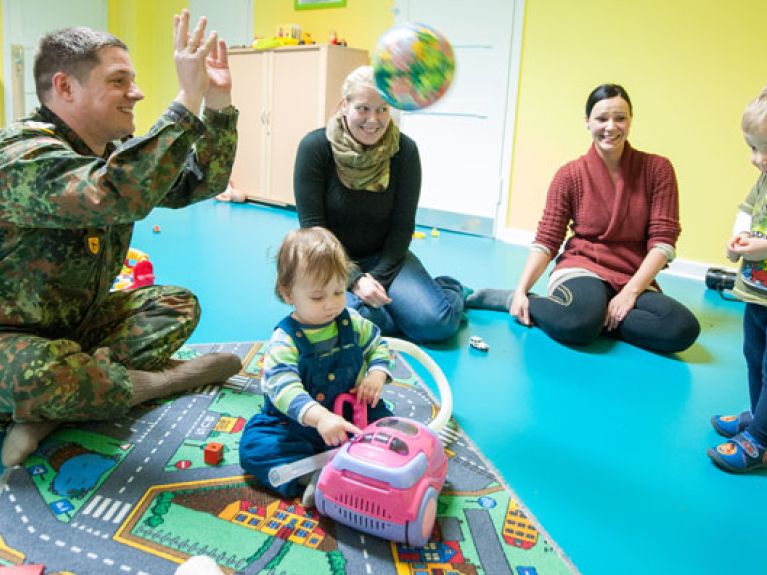New ideas
Family-friendly policies, equality of opportunity and openness towards immigrants are subjects of public debate in Germany.

Committed fathers
Although fathers in Germany would like to spend more time with their children, they also still want to work full-time. This somewhat contradictory finding is presented in a study by the Forsa opinion research institute entitled Fathers 2014 – Between Aspiration and Reality. Over 1,000 fathers aged between 20 and 55 were questioned as part of the survey. According to figures published by the Federal Statistical Office, more than a quarter of all fathers take up the parental allowance that was introduced in 2007 and is paid to mothers and fathers for up to 14 months after a child’s birth. Some 77% of them take two months of parental leave, while 7% received payments for twelve months.
27.3% of fathers now take parental leave – a new record
Modern army
Becoming more family-friendly is an important objective for all organizations – even the Bundeswehr, Germany’s armed forces. Defence Minister Ursula von der Leyen launched a debate about child care in barracks and part-time work for male and female soldiers immediately after taking office in December. She would like to make the Bundeswehr a more attractive employer, because it will only be able to compete with civilian employers “for the best minds” if part-time work and parental leave become accepted as perfectly normal. The minister is also considering long-term working time accounts, into which overtime is “paid” and from which free time is “withdrawn”. The expansion of flexible child care at army barracks is intended to be one of her first measures.
Ursula von der Leyen, Defence Minister
“My goal is to make the Bundeswehr into one of the most attractive employers”
Open arms
Many businesses and regions in Germany are promoting a “culture of welcome” by helping new employees from abroad settle into their new surroundings. Mentoring programmes are classic measures in this area. Some companies also offer workshops to promote cooperation in culturally mixed teams. The career-in-germany.net website encourages the exchange of examples of best practice. The Welcome to Germany portal at make-it-in-germany.de brings together all important information about careers and life in Germany.
The German healthcare market could employ 5,000 more doctors
Flexible working
Employment Minister Andrea Nahles wants to see less “obsession with work attendance” in companies and a broad debate about work culture. If greater emphasis were placed on teamwork in businesses, even people in top jobs would be able to cover for each other. Nahles, mother of a young daughter, wants to try this with other colleagues. Economics Minister Sigmar Gabriel also wants to spend at least one afternoon a week with his daughter.
Andrea Nahles, Employment Minister
“We must redefine full-time work. The obsession with work attendance must stop”
Dual citizenship
Previously, children born in Germany to foreign parents had to choose between German citizenship or that of their parents before their 23rd birthday. The new Federal Government has decided that in future all children who are born and grow up in Germany can keep their German citizenship – in addition to that of their parents. This is an especially important subject for people of Turkish origin, the largest immigrant group. Most of them were born in Germany, but only just under half have German passports. Nevertheless, dual citizenship will not become generally available to all foreigners who reside permanently in Germany irrespective of whether there were born in the country or not.
112,300 foreigners became German citizens in 2012
Women at the top
People in Germany have long discussed whether a minimum quota for female board members makes sense and how it could be implemented. Now it will be introduced. The Federal Government has agreed a statutory minimum quota for women on supervisory boards. In stock exchange-listed companies, at least 30% of the members of these control bodies are to be women from 2016 onwards. Initially, however, there will not be a binding quota for management boards. Instead large companies are to set their own targets for increasing the proportion of women in top management from 2015.
6.3% of management board members of DAX-listed companies were women in 2013

